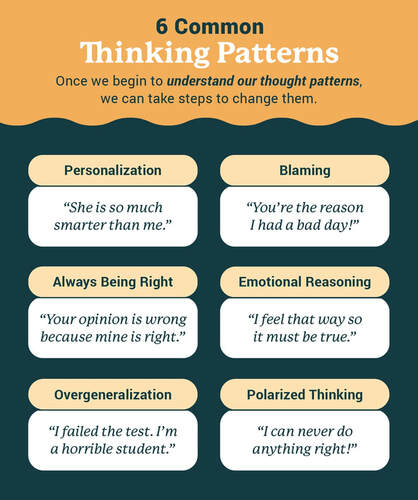Julia Morrissey is a content creator who enjoys writing on a variety of topics ranging from mental health to animal welfare. When she’s not writing you can find her running in Central Park in New York City or playing tennis.
Fortunately, with practice and patience, it’s possible to retrain your brain to think more positively. This post outlines six common thinking patterns to be aware of and offers ways you can retrain your brain.
6 common thinking patterns
Below are six common cognitive distortions:
- Personalization: You take things personally and often compare yourself to others. E.g., My friend canceled our dinner plans because they found someone more interesting to hang out with.
- Blaming: You constantly blame yourself and feel responsible for everything, even when you have no control over the potential outcome. E.g., My son had a terrible first semester at college because I’m a bad parent.
- Always Being Right: You think you’re always right and are argumentative with people who disagree with your claims. E.g., I will win this argument no matter what.
- Emotional Reasoning: You conclude that something is true based only on the way you’re feeling. E.g., I feel unattractive, so I must be unattractive.
- Overgeneralization: You apply the result of a single negative experience to all other related experiences. E.g., I wasn’t promoted at my last job, so my new manager will probably never promote me.
- Polarized Thinking: You see situations as either bad or good and with absolutely middle ground. E.g., The job offer is awful because it’s not exactly what I wanted.
Ways to retrain your brain
Here are some of the ways you can retrain your brain for success and positivity:
- Be cognizant of your thoughts: Learning to identify negative thoughts is a crucial first step in being able to combat them. Engaging in self-care practices, such as journaling or mindfulness, can help you develop a greater awareness of your thoughts and feelings.
- Turn negatives into positives: Challenging your inner critic is a powerful act that can help you take back control. Countering negative thoughts with positive ones can improve your psychological well being.
- Under your triggers: Recognizing what triggers you can help you better adapt to situations and control your emotional response.
- Create a personal mantra: A personal mantra or positive affirmation, such as “I can do this” or “I am enough,” can help you power through challenging thoughts and situations.
Check out more tips for retraining your brain from the University of St. Augustine for Health Sciences below.
If you haven’t already read the book, it’s a great place to start - Relationship Reboot: Break free from the bad habits in your relationship.
David B. Younger, Ph.D. is the creator of Love After Kids, for couples that have grown apart since having children. He is a clinical psychologist and couples therapist with a web-based private practice and lives in Austin, Texas with his wife, 15-year-old son, 6-year-old daughter and 8-year-old toy poodle.




 RSS Feed
RSS Feed